Article Review: Autism Spectrum Disorder and Social Skills Training
VerifiedAdded on 2022/07/28
|8
|2410
|30
Report
AI Summary
This report provides a comprehensive review of an article examining the impact of social skills training groups on children with Autism Spectrum Disorder (ASD). The review critically analyzes the article's strengths, such as its detailed description of social cognition in autism and its use of peer-reviewed literature, as well as its weaknesses, including the restrictive sample size and limited age range of participants. The report also discusses ethical considerations and compares the article's findings with those of other studies, highlighting the need for further research and improvements in training methodologies. The review also highlights the lack of recommendations on how the social skills can be improvised, the absence of the impact of the reduced social skills on the education spectrum of children. Overall, the review offers a balanced assessment of the article's contributions to the field, emphasizing the need for more inclusive approaches and larger sample sizes to achieve more conclusive results.
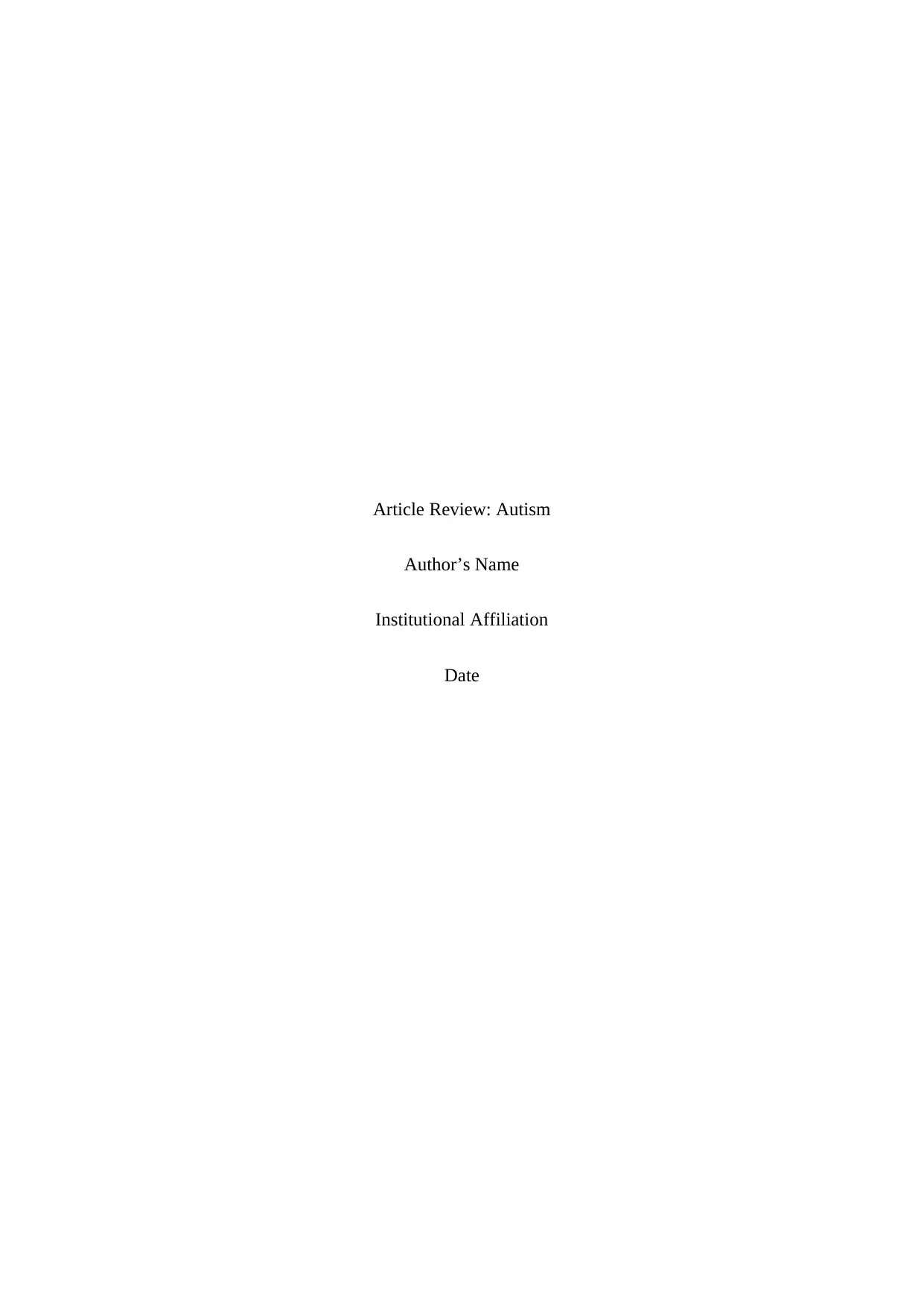
Article Review: Autism
Author’s Name
Institutional Affiliation
Date
Author’s Name
Institutional Affiliation
Date
Paraphrase This Document
Need a fresh take? Get an instant paraphrase of this document with our AI Paraphraser
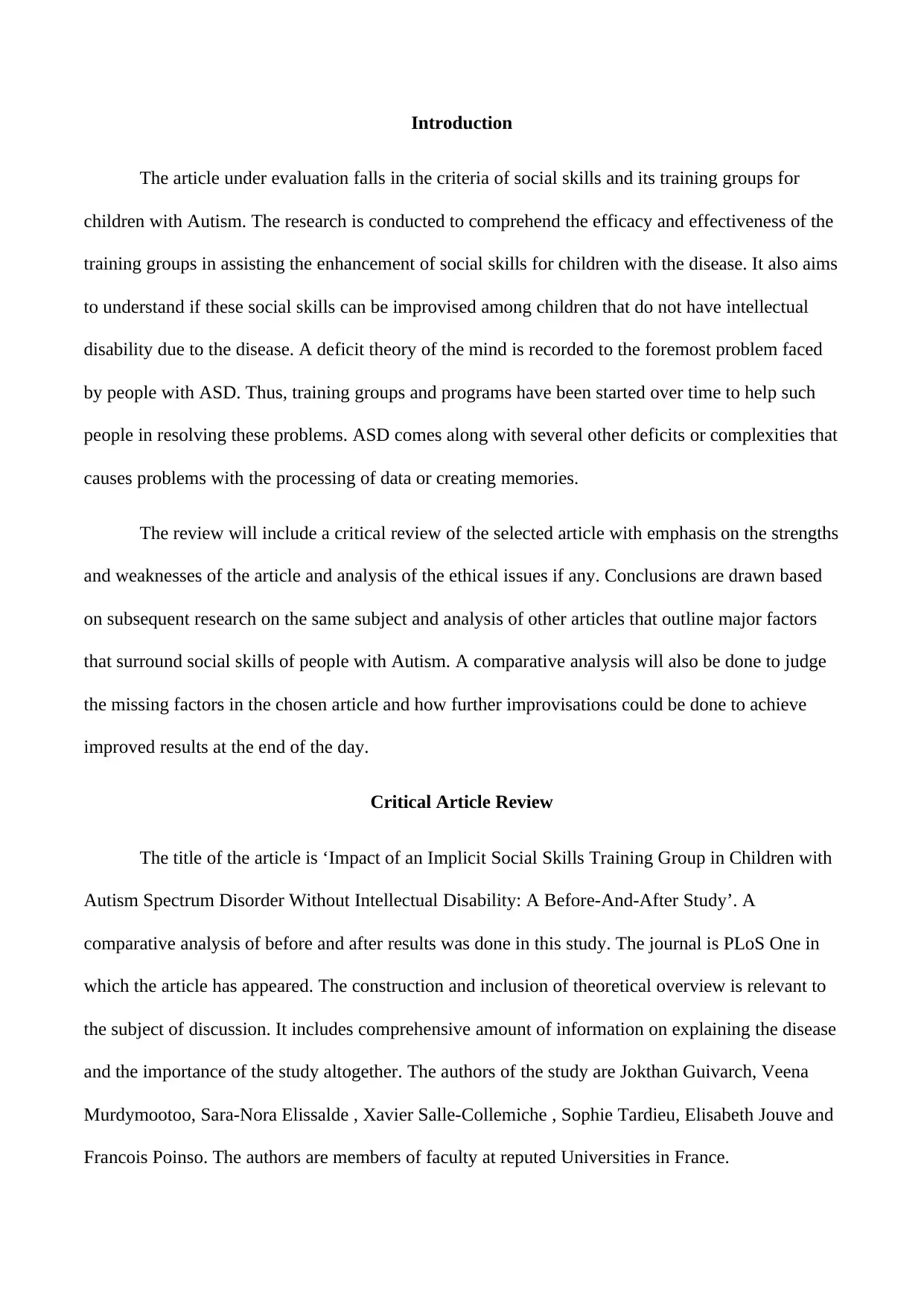
Introduction
The article under evaluation falls in the criteria of social skills and its training groups for
children with Autism. The research is conducted to comprehend the efficacy and effectiveness of the
training groups in assisting the enhancement of social skills for children with the disease. It also aims
to understand if these social skills can be improvised among children that do not have intellectual
disability due to the disease. A deficit theory of the mind is recorded to the foremost problem faced
by people with ASD. Thus, training groups and programs have been started over time to help such
people in resolving these problems. ASD comes along with several other deficits or complexities that
causes problems with the processing of data or creating memories.
The review will include a critical review of the selected article with emphasis on the strengths
and weaknesses of the article and analysis of the ethical issues if any. Conclusions are drawn based
on subsequent research on the same subject and analysis of other articles that outline major factors
that surround social skills of people with Autism. A comparative analysis will also be done to judge
the missing factors in the chosen article and how further improvisations could be done to achieve
improved results at the end of the day.
Critical Article Review
The title of the article is ‘Impact of an Implicit Social Skills Training Group in Children with
Autism Spectrum Disorder Without Intellectual Disability: A Before-And-After Study’. A
comparative analysis of before and after results was done in this study. The journal is PLoS One in
which the article has appeared. The construction and inclusion of theoretical overview is relevant to
the subject of discussion. It includes comprehensive amount of information on explaining the disease
and the importance of the study altogether. The authors of the study are Jokthan Guivarch, Veena
Murdymootoo, Sara-Nora Elissalde , Xavier Salle-Collemiche , Sophie Tardieu, Elisabeth Jouve and
Francois Poinso. The authors are members of faculty at reputed Universities in France.
The article under evaluation falls in the criteria of social skills and its training groups for
children with Autism. The research is conducted to comprehend the efficacy and effectiveness of the
training groups in assisting the enhancement of social skills for children with the disease. It also aims
to understand if these social skills can be improvised among children that do not have intellectual
disability due to the disease. A deficit theory of the mind is recorded to the foremost problem faced
by people with ASD. Thus, training groups and programs have been started over time to help such
people in resolving these problems. ASD comes along with several other deficits or complexities that
causes problems with the processing of data or creating memories.
The review will include a critical review of the selected article with emphasis on the strengths
and weaknesses of the article and analysis of the ethical issues if any. Conclusions are drawn based
on subsequent research on the same subject and analysis of other articles that outline major factors
that surround social skills of people with Autism. A comparative analysis will also be done to judge
the missing factors in the chosen article and how further improvisations could be done to achieve
improved results at the end of the day.
Critical Article Review
The title of the article is ‘Impact of an Implicit Social Skills Training Group in Children with
Autism Spectrum Disorder Without Intellectual Disability: A Before-And-After Study’. A
comparative analysis of before and after results was done in this study. The journal is PLoS One in
which the article has appeared. The construction and inclusion of theoretical overview is relevant to
the subject of discussion. It includes comprehensive amount of information on explaining the disease
and the importance of the study altogether. The authors of the study are Jokthan Guivarch, Veena
Murdymootoo, Sara-Nora Elissalde , Xavier Salle-Collemiche , Sophie Tardieu, Elisabeth Jouve and
Francois Poinso. The authors are members of faculty at reputed Universities in France.
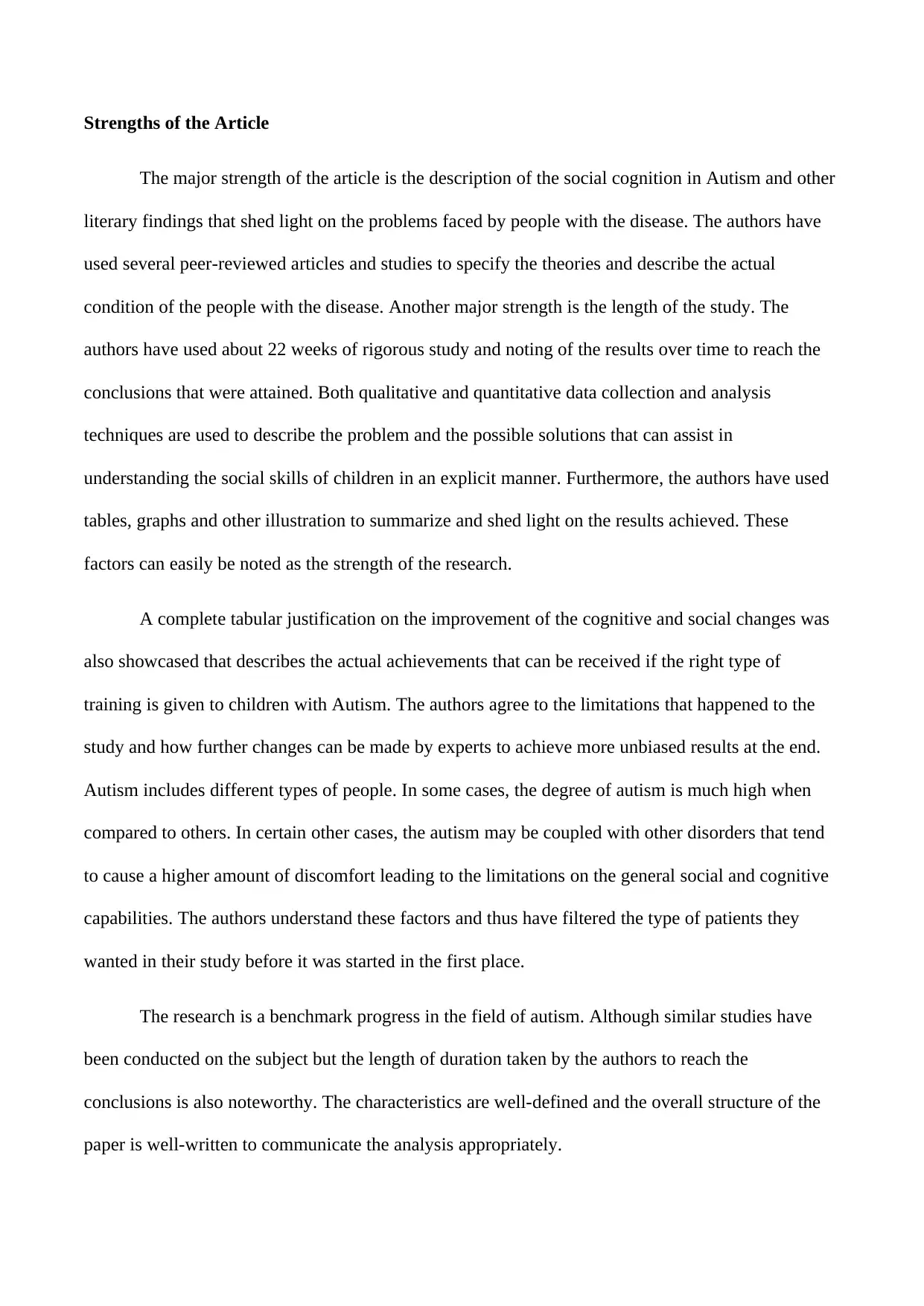
Strengths of the Article
The major strength of the article is the description of the social cognition in Autism and other
literary findings that shed light on the problems faced by people with the disease. The authors have
used several peer-reviewed articles and studies to specify the theories and describe the actual
condition of the people with the disease. Another major strength is the length of the study. The
authors have used about 22 weeks of rigorous study and noting of the results over time to reach the
conclusions that were attained. Both qualitative and quantitative data collection and analysis
techniques are used to describe the problem and the possible solutions that can assist in
understanding the social skills of children in an explicit manner. Furthermore, the authors have used
tables, graphs and other illustration to summarize and shed light on the results achieved. These
factors can easily be noted as the strength of the research.
A complete tabular justification on the improvement of the cognitive and social changes was
also showcased that describes the actual achievements that can be received if the right type of
training is given to children with Autism. The authors agree to the limitations that happened to the
study and how further changes can be made by experts to achieve more unbiased results at the end.
Autism includes different types of people. In some cases, the degree of autism is much high when
compared to others. In certain other cases, the autism may be coupled with other disorders that tend
to cause a higher amount of discomfort leading to the limitations on the general social and cognitive
capabilities. The authors understand these factors and thus have filtered the type of patients they
wanted in their study before it was started in the first place.
The research is a benchmark progress in the field of autism. Although similar studies have
been conducted on the subject but the length of duration taken by the authors to reach the
conclusions is also noteworthy. The characteristics are well-defined and the overall structure of the
paper is well-written to communicate the analysis appropriately.
The major strength of the article is the description of the social cognition in Autism and other
literary findings that shed light on the problems faced by people with the disease. The authors have
used several peer-reviewed articles and studies to specify the theories and describe the actual
condition of the people with the disease. Another major strength is the length of the study. The
authors have used about 22 weeks of rigorous study and noting of the results over time to reach the
conclusions that were attained. Both qualitative and quantitative data collection and analysis
techniques are used to describe the problem and the possible solutions that can assist in
understanding the social skills of children in an explicit manner. Furthermore, the authors have used
tables, graphs and other illustration to summarize and shed light on the results achieved. These
factors can easily be noted as the strength of the research.
A complete tabular justification on the improvement of the cognitive and social changes was
also showcased that describes the actual achievements that can be received if the right type of
training is given to children with Autism. The authors agree to the limitations that happened to the
study and how further changes can be made by experts to achieve more unbiased results at the end.
Autism includes different types of people. In some cases, the degree of autism is much high when
compared to others. In certain other cases, the autism may be coupled with other disorders that tend
to cause a higher amount of discomfort leading to the limitations on the general social and cognitive
capabilities. The authors understand these factors and thus have filtered the type of patients they
wanted in their study before it was started in the first place.
The research is a benchmark progress in the field of autism. Although similar studies have
been conducted on the subject but the length of duration taken by the authors to reach the
conclusions is also noteworthy. The characteristics are well-defined and the overall structure of the
paper is well-written to communicate the analysis appropriately.
⊘ This is a preview!⊘
Do you want full access?
Subscribe today to unlock all pages.

Trusted by 1+ million students worldwide
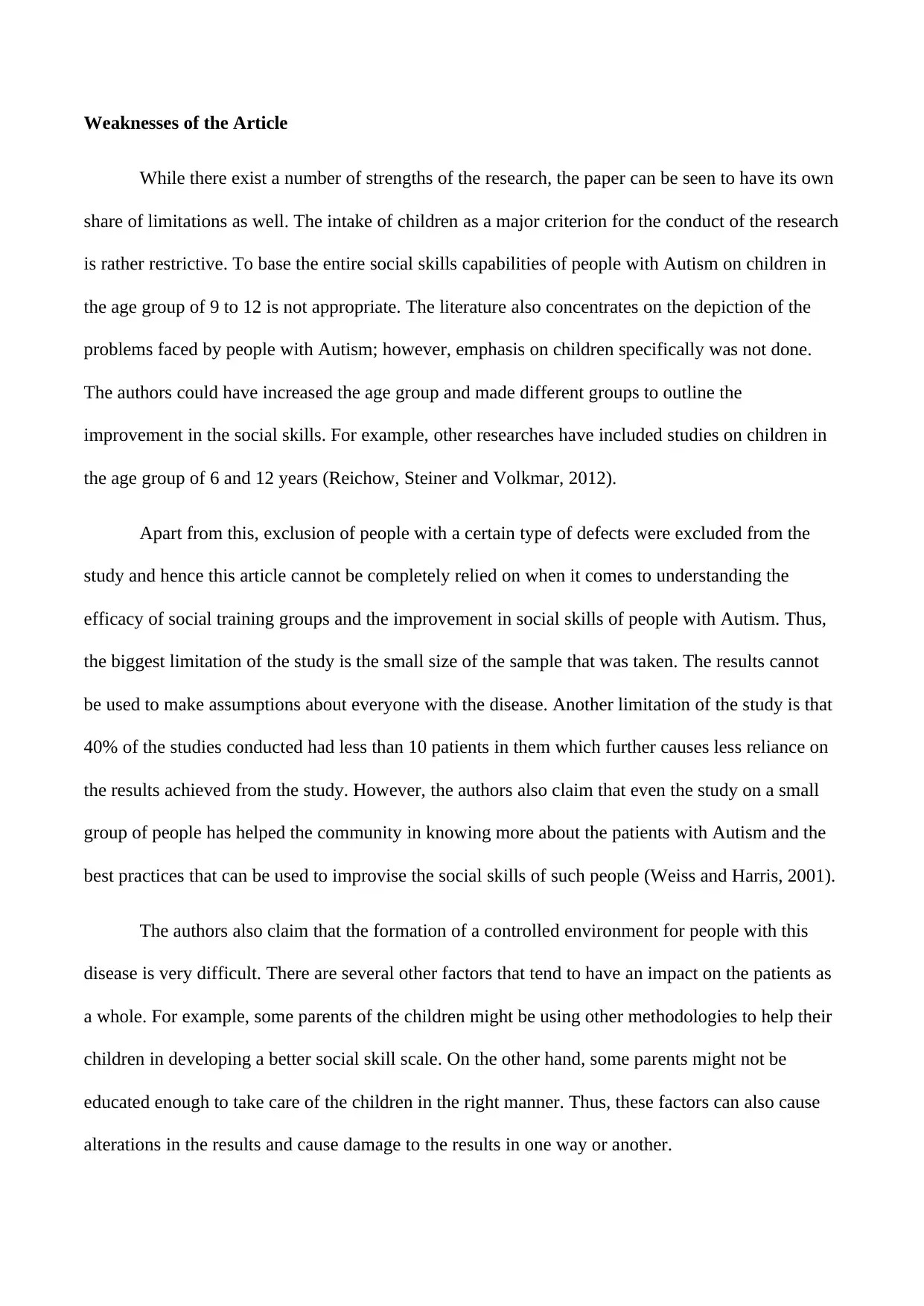
Weaknesses of the Article
While there exist a number of strengths of the research, the paper can be seen to have its own
share of limitations as well. The intake of children as a major criterion for the conduct of the research
is rather restrictive. To base the entire social skills capabilities of people with Autism on children in
the age group of 9 to 12 is not appropriate. The literature also concentrates on the depiction of the
problems faced by people with Autism; however, emphasis on children specifically was not done.
The authors could have increased the age group and made different groups to outline the
improvement in the social skills. For example, other researches have included studies on children in
the age group of 6 and 12 years (Reichow, Steiner and Volkmar, 2012).
Apart from this, exclusion of people with a certain type of defects were excluded from the
study and hence this article cannot be completely relied on when it comes to understanding the
efficacy of social training groups and the improvement in social skills of people with Autism. Thus,
the biggest limitation of the study is the small size of the sample that was taken. The results cannot
be used to make assumptions about everyone with the disease. Another limitation of the study is that
40% of the studies conducted had less than 10 patients in them which further causes less reliance on
the results achieved from the study. However, the authors also claim that even the study on a small
group of people has helped the community in knowing more about the patients with Autism and the
best practices that can be used to improvise the social skills of such people (Weiss and Harris, 2001).
The authors also claim that the formation of a controlled environment for people with this
disease is very difficult. There are several other factors that tend to have an impact on the patients as
a whole. For example, some parents of the children might be using other methodologies to help their
children in developing a better social skill scale. On the other hand, some parents might not be
educated enough to take care of the children in the right manner. Thus, these factors can also cause
alterations in the results and cause damage to the results in one way or another.
While there exist a number of strengths of the research, the paper can be seen to have its own
share of limitations as well. The intake of children as a major criterion for the conduct of the research
is rather restrictive. To base the entire social skills capabilities of people with Autism on children in
the age group of 9 to 12 is not appropriate. The literature also concentrates on the depiction of the
problems faced by people with Autism; however, emphasis on children specifically was not done.
The authors could have increased the age group and made different groups to outline the
improvement in the social skills. For example, other researches have included studies on children in
the age group of 6 and 12 years (Reichow, Steiner and Volkmar, 2012).
Apart from this, exclusion of people with a certain type of defects were excluded from the
study and hence this article cannot be completely relied on when it comes to understanding the
efficacy of social training groups and the improvement in social skills of people with Autism. Thus,
the biggest limitation of the study is the small size of the sample that was taken. The results cannot
be used to make assumptions about everyone with the disease. Another limitation of the study is that
40% of the studies conducted had less than 10 patients in them which further causes less reliance on
the results achieved from the study. However, the authors also claim that even the study on a small
group of people has helped the community in knowing more about the patients with Autism and the
best practices that can be used to improvise the social skills of such people (Weiss and Harris, 2001).
The authors also claim that the formation of a controlled environment for people with this
disease is very difficult. There are several other factors that tend to have an impact on the patients as
a whole. For example, some parents of the children might be using other methodologies to help their
children in developing a better social skill scale. On the other hand, some parents might not be
educated enough to take care of the children in the right manner. Thus, these factors can also cause
alterations in the results and cause damage to the results in one way or another.
Paraphrase This Document
Need a fresh take? Get an instant paraphrase of this document with our AI Paraphraser
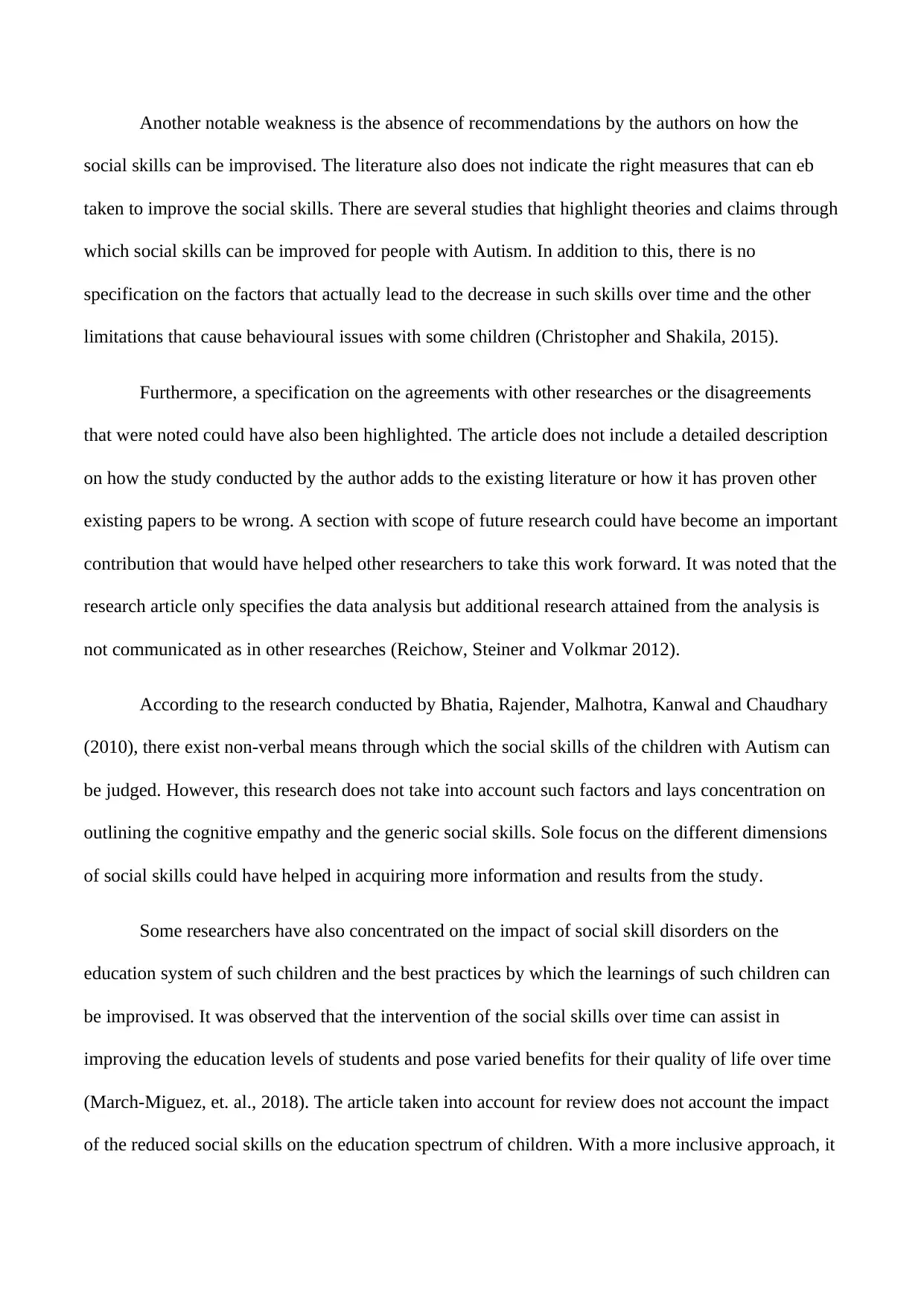
Another notable weakness is the absence of recommendations by the authors on how the
social skills can be improvised. The literature also does not indicate the right measures that can eb
taken to improve the social skills. There are several studies that highlight theories and claims through
which social skills can be improved for people with Autism. In addition to this, there is no
specification on the factors that actually lead to the decrease in such skills over time and the other
limitations that cause behavioural issues with some children (Christopher and Shakila, 2015).
Furthermore, a specification on the agreements with other researches or the disagreements
that were noted could have also been highlighted. The article does not include a detailed description
on how the study conducted by the author adds to the existing literature or how it has proven other
existing papers to be wrong. A section with scope of future research could have become an important
contribution that would have helped other researchers to take this work forward. It was noted that the
research article only specifies the data analysis but additional research attained from the analysis is
not communicated as in other researches (Reichow, Steiner and Volkmar 2012).
According to the research conducted by Bhatia, Rajender, Malhotra, Kanwal and Chaudhary
(2010), there exist non-verbal means through which the social skills of the children with Autism can
be judged. However, this research does not take into account such factors and lays concentration on
outlining the cognitive empathy and the generic social skills. Sole focus on the different dimensions
of social skills could have helped in acquiring more information and results from the study.
Some researchers have also concentrated on the impact of social skill disorders on the
education system of such children and the best practices by which the learnings of such children can
be improvised. It was observed that the intervention of the social skills over time can assist in
improving the education levels of students and pose varied benefits for their quality of life over time
(March-Miguez, et. al., 2018). The article taken into account for review does not account the impact
of the reduced social skills on the education spectrum of children. With a more inclusive approach, it
social skills can be improvised. The literature also does not indicate the right measures that can eb
taken to improve the social skills. There are several studies that highlight theories and claims through
which social skills can be improved for people with Autism. In addition to this, there is no
specification on the factors that actually lead to the decrease in such skills over time and the other
limitations that cause behavioural issues with some children (Christopher and Shakila, 2015).
Furthermore, a specification on the agreements with other researches or the disagreements
that were noted could have also been highlighted. The article does not include a detailed description
on how the study conducted by the author adds to the existing literature or how it has proven other
existing papers to be wrong. A section with scope of future research could have become an important
contribution that would have helped other researchers to take this work forward. It was noted that the
research article only specifies the data analysis but additional research attained from the analysis is
not communicated as in other researches (Reichow, Steiner and Volkmar 2012).
According to the research conducted by Bhatia, Rajender, Malhotra, Kanwal and Chaudhary
(2010), there exist non-verbal means through which the social skills of the children with Autism can
be judged. However, this research does not take into account such factors and lays concentration on
outlining the cognitive empathy and the generic social skills. Sole focus on the different dimensions
of social skills could have helped in acquiring more information and results from the study.
Some researchers have also concentrated on the impact of social skill disorders on the
education system of such children and the best practices by which the learnings of such children can
be improvised. It was observed that the intervention of the social skills over time can assist in
improving the education levels of students and pose varied benefits for their quality of life over time
(March-Miguez, et. al., 2018). The article taken into account for review does not account the impact
of the reduced social skills on the education spectrum of children. With a more inclusive approach, it
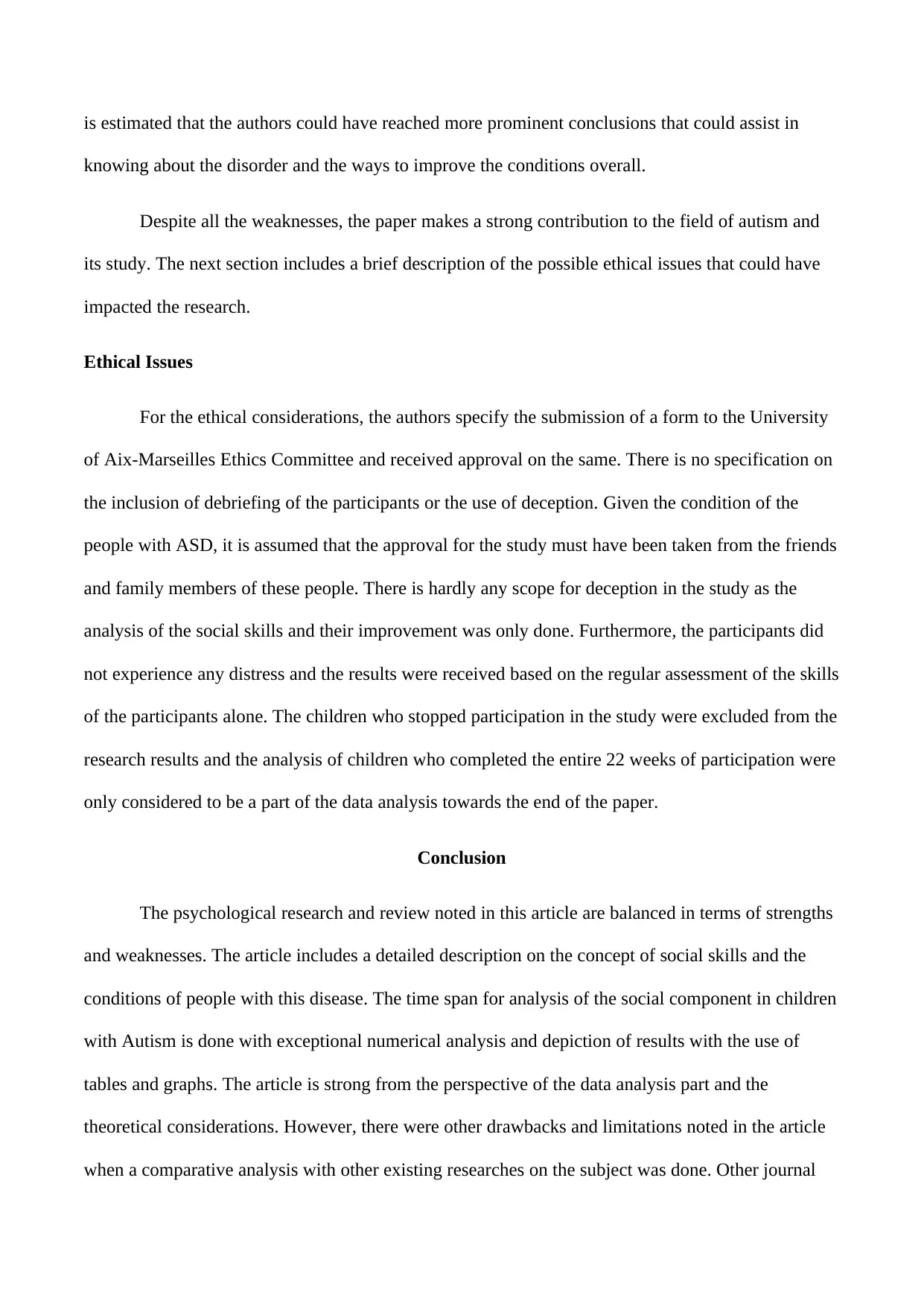
is estimated that the authors could have reached more prominent conclusions that could assist in
knowing about the disorder and the ways to improve the conditions overall.
Despite all the weaknesses, the paper makes a strong contribution to the field of autism and
its study. The next section includes a brief description of the possible ethical issues that could have
impacted the research.
Ethical Issues
For the ethical considerations, the authors specify the submission of a form to the University
of Aix-Marseilles Ethics Committee and received approval on the same. There is no specification on
the inclusion of debriefing of the participants or the use of deception. Given the condition of the
people with ASD, it is assumed that the approval for the study must have been taken from the friends
and family members of these people. There is hardly any scope for deception in the study as the
analysis of the social skills and their improvement was only done. Furthermore, the participants did
not experience any distress and the results were received based on the regular assessment of the skills
of the participants alone. The children who stopped participation in the study were excluded from the
research results and the analysis of children who completed the entire 22 weeks of participation were
only considered to be a part of the data analysis towards the end of the paper.
Conclusion
The psychological research and review noted in this article are balanced in terms of strengths
and weaknesses. The article includes a detailed description on the concept of social skills and the
conditions of people with this disease. The time span for analysis of the social component in children
with Autism is done with exceptional numerical analysis and depiction of results with the use of
tables and graphs. The article is strong from the perspective of the data analysis part and the
theoretical considerations. However, there were other drawbacks and limitations noted in the article
when a comparative analysis with other existing researches on the subject was done. Other journal
knowing about the disorder and the ways to improve the conditions overall.
Despite all the weaknesses, the paper makes a strong contribution to the field of autism and
its study. The next section includes a brief description of the possible ethical issues that could have
impacted the research.
Ethical Issues
For the ethical considerations, the authors specify the submission of a form to the University
of Aix-Marseilles Ethics Committee and received approval on the same. There is no specification on
the inclusion of debriefing of the participants or the use of deception. Given the condition of the
people with ASD, it is assumed that the approval for the study must have been taken from the friends
and family members of these people. There is hardly any scope for deception in the study as the
analysis of the social skills and their improvement was only done. Furthermore, the participants did
not experience any distress and the results were received based on the regular assessment of the skills
of the participants alone. The children who stopped participation in the study were excluded from the
research results and the analysis of children who completed the entire 22 weeks of participation were
only considered to be a part of the data analysis towards the end of the paper.
Conclusion
The psychological research and review noted in this article are balanced in terms of strengths
and weaknesses. The article includes a detailed description on the concept of social skills and the
conditions of people with this disease. The time span for analysis of the social component in children
with Autism is done with exceptional numerical analysis and depiction of results with the use of
tables and graphs. The article is strong from the perspective of the data analysis part and the
theoretical considerations. However, there were other drawbacks and limitations noted in the article
when a comparative analysis with other existing researches on the subject was done. Other journal
⊘ This is a preview!⊘
Do you want full access?
Subscribe today to unlock all pages.

Trusted by 1+ million students worldwide
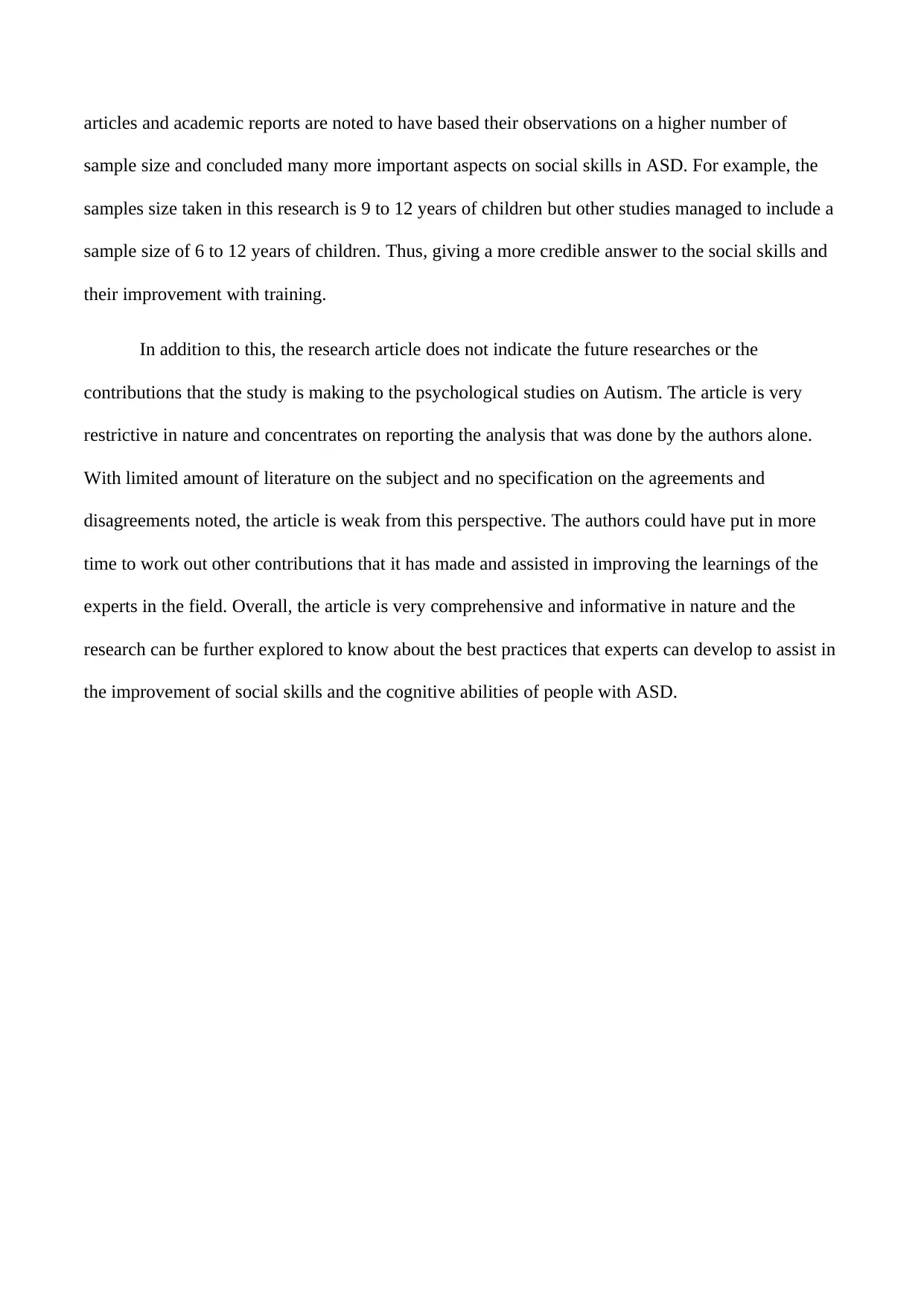
articles and academic reports are noted to have based their observations on a higher number of
sample size and concluded many more important aspects on social skills in ASD. For example, the
samples size taken in this research is 9 to 12 years of children but other studies managed to include a
sample size of 6 to 12 years of children. Thus, giving a more credible answer to the social skills and
their improvement with training.
In addition to this, the research article does not indicate the future researches or the
contributions that the study is making to the psychological studies on Autism. The article is very
restrictive in nature and concentrates on reporting the analysis that was done by the authors alone.
With limited amount of literature on the subject and no specification on the agreements and
disagreements noted, the article is weak from this perspective. The authors could have put in more
time to work out other contributions that it has made and assisted in improving the learnings of the
experts in the field. Overall, the article is very comprehensive and informative in nature and the
research can be further explored to know about the best practices that experts can develop to assist in
the improvement of social skills and the cognitive abilities of people with ASD.
sample size and concluded many more important aspects on social skills in ASD. For example, the
samples size taken in this research is 9 to 12 years of children but other studies managed to include a
sample size of 6 to 12 years of children. Thus, giving a more credible answer to the social skills and
their improvement with training.
In addition to this, the research article does not indicate the future researches or the
contributions that the study is making to the psychological studies on Autism. The article is very
restrictive in nature and concentrates on reporting the analysis that was done by the authors alone.
With limited amount of literature on the subject and no specification on the agreements and
disagreements noted, the article is weak from this perspective. The authors could have put in more
time to work out other contributions that it has made and assisted in improving the learnings of the
experts in the field. Overall, the article is very comprehensive and informative in nature and the
research can be further explored to know about the best practices that experts can develop to assist in
the improvement of social skills and the cognitive abilities of people with ASD.
Paraphrase This Document
Need a fresh take? Get an instant paraphrase of this document with our AI Paraphraser
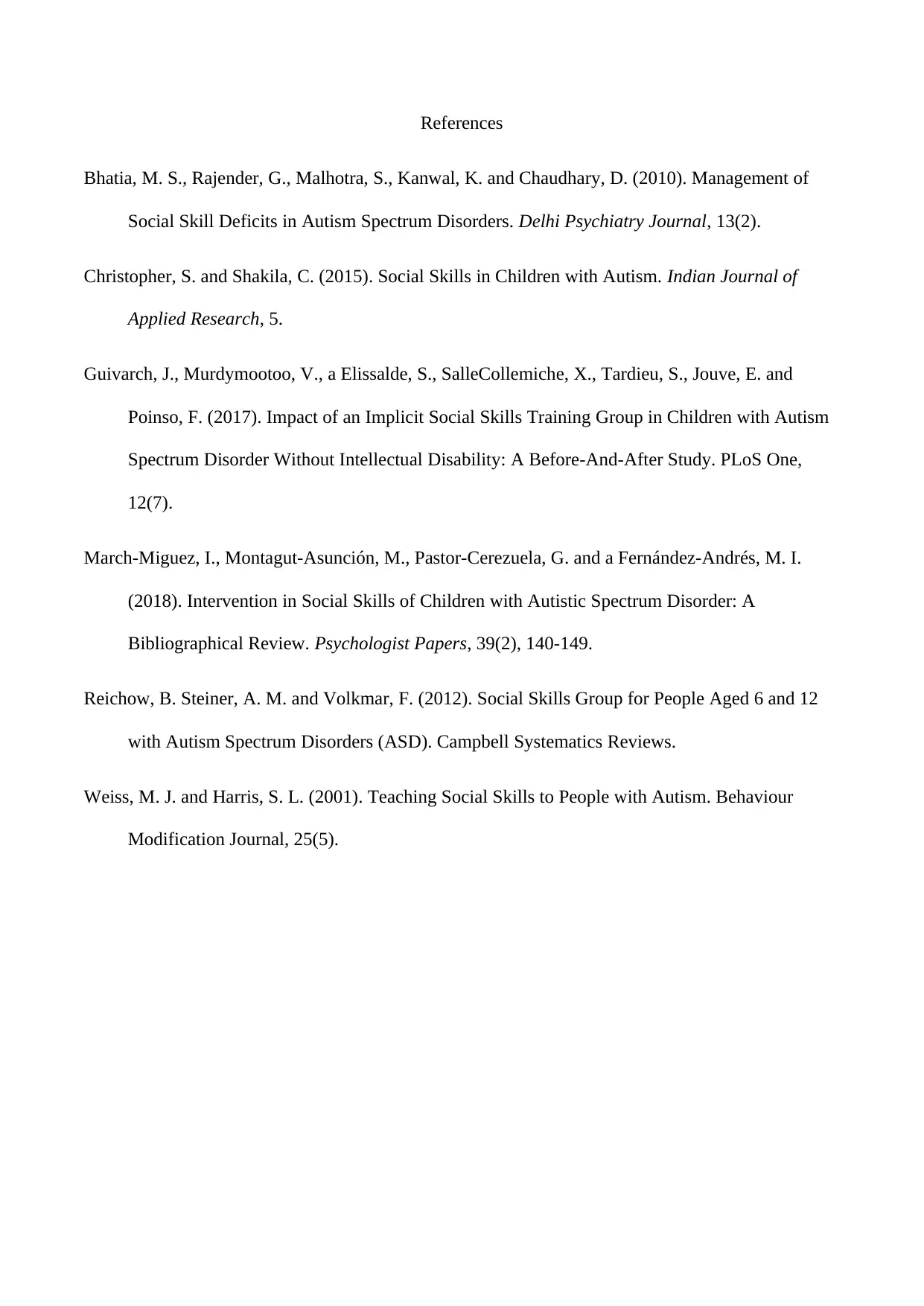
References
Bhatia, M. S., Rajender, G., Malhotra, S., Kanwal, K. and Chaudhary, D. (2010). Management of
Social Skill Deficits in Autism Spectrum Disorders. Delhi Psychiatry Journal, 13(2).
Christopher, S. and Shakila, C. (2015). Social Skills in Children with Autism. Indian Journal of
Applied Research, 5.
Guivarch, J., Murdymootoo, V., a Elissalde, S., SalleCollemiche, X., Tardieu, S., Jouve, E. and
Poinso, F. (2017). Impact of an Implicit Social Skills Training Group in Children with Autism
Spectrum Disorder Without Intellectual Disability: A Before-And-After Study. PLoS One,
12(7).
March-Miguez, I., Montagut-Asunción, M., Pastor-Cerezuela, G. and a Fernández-Andrés, M. I.
(2018). Intervention in Social Skills of Children with Autistic Spectrum Disorder: A
Bibliographical Review. Psychologist Papers, 39(2), 140-149.
Reichow, B. Steiner, A. M. and Volkmar, F. (2012). Social Skills Group for People Aged 6 and 12
with Autism Spectrum Disorders (ASD). Campbell Systematics Reviews.
Weiss, M. J. and Harris, S. L. (2001). Teaching Social Skills to People with Autism. Behaviour
Modification Journal, 25(5).
Bhatia, M. S., Rajender, G., Malhotra, S., Kanwal, K. and Chaudhary, D. (2010). Management of
Social Skill Deficits in Autism Spectrum Disorders. Delhi Psychiatry Journal, 13(2).
Christopher, S. and Shakila, C. (2015). Social Skills in Children with Autism. Indian Journal of
Applied Research, 5.
Guivarch, J., Murdymootoo, V., a Elissalde, S., SalleCollemiche, X., Tardieu, S., Jouve, E. and
Poinso, F. (2017). Impact of an Implicit Social Skills Training Group in Children with Autism
Spectrum Disorder Without Intellectual Disability: A Before-And-After Study. PLoS One,
12(7).
March-Miguez, I., Montagut-Asunción, M., Pastor-Cerezuela, G. and a Fernández-Andrés, M. I.
(2018). Intervention in Social Skills of Children with Autistic Spectrum Disorder: A
Bibliographical Review. Psychologist Papers, 39(2), 140-149.
Reichow, B. Steiner, A. M. and Volkmar, F. (2012). Social Skills Group for People Aged 6 and 12
with Autism Spectrum Disorders (ASD). Campbell Systematics Reviews.
Weiss, M. J. and Harris, S. L. (2001). Teaching Social Skills to People with Autism. Behaviour
Modification Journal, 25(5).
1 out of 8
Related Documents
Your All-in-One AI-Powered Toolkit for Academic Success.
+13062052269
info@desklib.com
Available 24*7 on WhatsApp / Email
![[object Object]](/_next/static/media/star-bottom.7253800d.svg)
Unlock your academic potential
Copyright © 2020–2025 A2Z Services. All Rights Reserved. Developed and managed by ZUCOL.





